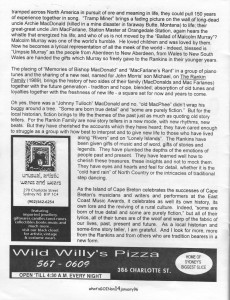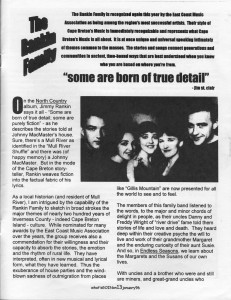The Rankin Family is recognized again this year by the east Coast Music Association as being among the region’s most successful artists. Their style of Cape Breton’s Music is immediately recognizable and represents what Cape Breton’s Music is all about. It is at once unique and universal, speaking intimately of themes common to the masses. The stories and songs connect generations and communities in ancient, time-bound ways that are best understood when you know who are, based on where you’re from.
On the North Country album, Jimmy Rankin says it all—“Some are born of true detail; some are purely fiction”—as he describes the stories told at Johnnie MacMaster’s house. Sure, there’s a Mull River as identified in the “Mull River Shuffle” and there was (of happy memory) a Johnny MacMaster. But in the mode of the Cape Breton storyteller, Rankin weaves fiction into the factual fabric of his lyrics.
As a local historian (and resident of Mull River), I am intrigued by the capability of the Rankin Family to sketch in broad strokes the major themes of nearly two hundred years of Inverness County—indeed Cape Breton Island—culture. While nominated for many awards by the East Coast Music Association over the years, the group receives also a commendation for their willingness and their capacity to absorb the stories, the emotion and the rhythm of rural life. They have interpreted, often in new musical and lyrical form, what they have learned. Thus the exuberance of house parties and the windblown sadness of outmigration from places like “Gillis Mountain” are now presented for all the world to see and to feel.
The members of this family band listened to the words, to the major and minor chords of delight in people, as their uncles Danny and Freddy Wright of “river drive” fame told them stories of life and love and death. They heard deep within their creative psyche the will to live and work of their grandmother Margaret and the enduring curiosity of their aunt Susie. An so, in Endless Seasons, we learn about the Margarets and the Susans of our own lives.
 With uncles and a brother who were and still are miners, and great-grand uncles who tramped across North America in pursuit of ore and meaning in life, they could pull 150 years of experience together in one song. “Tramp Miner” brings a fading picture on the wall of long-dead uncle Archie MacDonald (killed in a mine disaster in faraway Butte, Montana) to life; their great-great uncle Jim MacFarlane, Station Master as Orangedale Station, again hears the whistle that energized his life; and who of us is not moved by the “Ballad of Malcolm Murray”? Malcolm Murray was one of the world’s humble. He loved children and was loved by them. Now he becomes a lyrical representation of all the meek in the world—indeed, blessed is “Umpsie Murray” as the people from Aberdeen to New Aberdeen, from Wales to New South Wales are handed the gifts which Murray so freely gave to the Rankins in their younger years.
With uncles and a brother who were and still are miners, and great-grand uncles who tramped across North America in pursuit of ore and meaning in life, they could pull 150 years of experience together in one song. “Tramp Miner” brings a fading picture on the wall of long-dead uncle Archie MacDonald (killed in a mine disaster in faraway Butte, Montana) to life; their great-great uncle Jim MacFarlane, Station Master as Orangedale Station, again hears the whistle that energized his life; and who of us is not moved by the “Ballad of Malcolm Murray”? Malcolm Murray was one of the world’s humble. He loved children and was loved by them. Now he becomes a lyrical representation of all the meek in the world—indeed, blessed is “Umpsie Murray” as the people from Aberdeen to New Aberdeen, from Wales to New South Wales are handed the gifts which Murray so freely gave to the Rankins in their younger years.
The placing of “Memories of Bishop MacDonald” and “MacFarlane’s Rant” in a group of piano tunes and the sharing of the new reel, named for John Morris’ son Michael, on The Rankin Family (1989), brings the history of two sides of their family (MacDonalds and MacFarlanes) together with the future generation—tradition and hope, blended; absorption of old tunes and loyalties together with the freshness of new life—a square set for now and years to come.
Oh yes, there was a “Johnny Tulloch” MacDonald and no, “old MacPhee” didn’t wrap his buggy around a tree. “Some are born of true detail” and “some are purely fiction”. But for the local historian, fiction brings to life the themes of the past just as much as quoting old storytellers. For the Rankin Family are now storytellers in a new mode, with new rhythms, new beats. But they have cherished the accounts which they have heard; they have cared enough to struggle as a group with how best to interpret and to give new life to those who have lived along “Rivers” and on “Lonely Islands”. The Rankins have been given gifts of music and of word, gifts of stories and legends. They have plumbed the depths of the emotions of people past and present. They have learned well how to cherish these treasures, there insights and not to mock them. They have eyes and hearts and feel for detail, whether it is the “cold hard rain” of North Country or the intricacies of traditional step dancing.
As the island of Cape Breton celebrates the successes of Cape Breton’s musicians and writers and performers at the East Coast Music Awards, it celebrates as well its own history, its own lore and the reviving of a rural culture. Indeed, “some are born of true detail and some are purely fiction”, but all of their lyrics, all of their tunes are of the woof and warp of the fabric of our lives, past, present and future. As a local historian and some-time storyteller, I am grateful. And I look for more, more from the Rankins and from others who are tradition bearers in a new form. (WGO # 8, January 1996)


